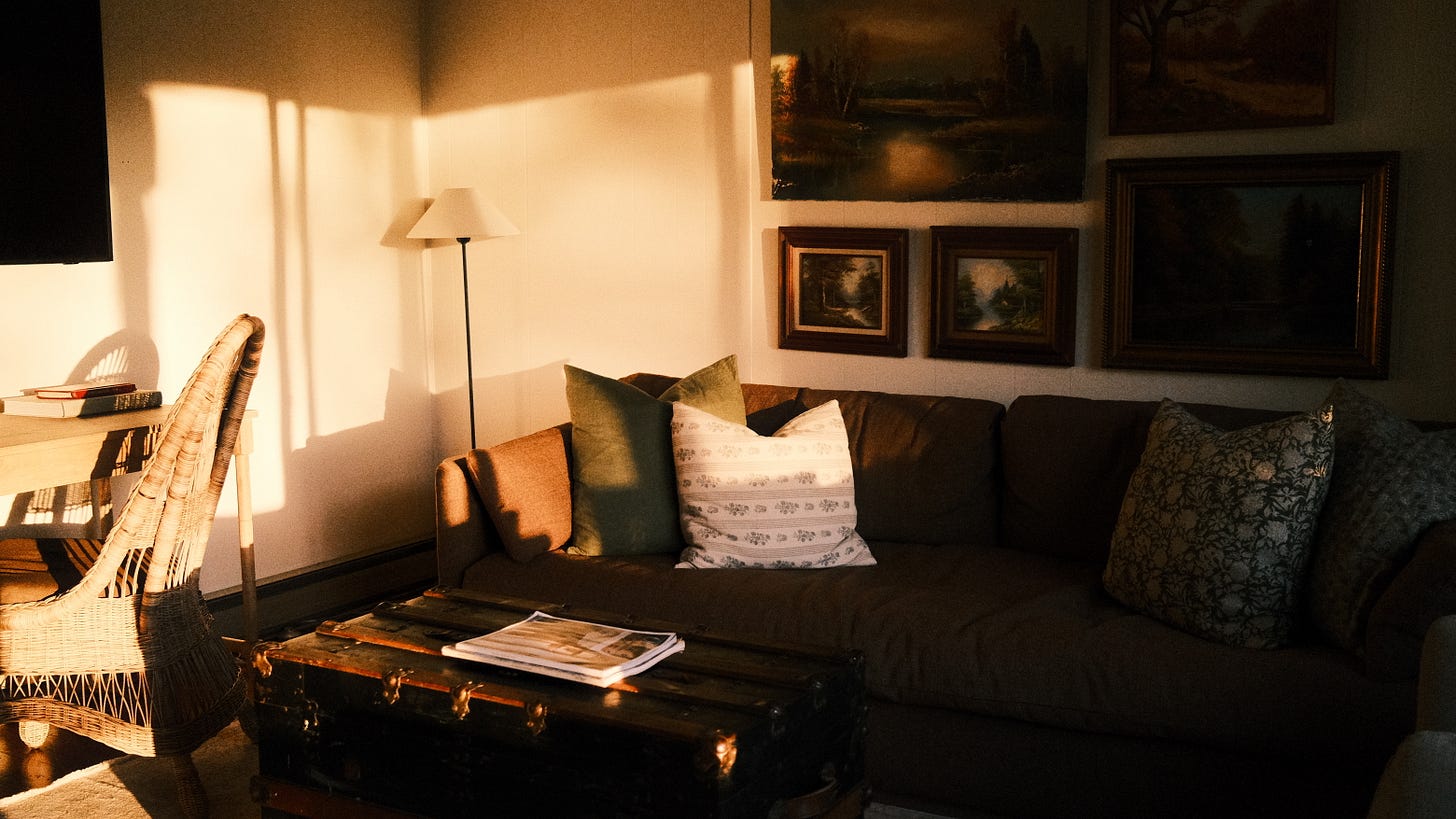If you’re new here, welcome! From a therapists office to your inbox - More to the Story helps you take your mental health, relationships, faith, and creativity seriously through personal essays and clinical perspective.
The path to becoming a therapist for me is quite interesting. After graduating college, where I played football and earned a degree in religion thinking I’d become a pastor, I found my way to managing an art gallery and creative brand. It wasn’t until some personal issues arose with my girlfriend—now my wife—nearly a decade ago (a story for another day) that I stepped into a counselor's office for the first time.
Fast forward through many years of realizing there was more to my story; I began to engage with my trauma in individual therapy, worked on our relationship in couples therapy, faced my addiction, got involved in 12-step recovery, and truly started “doing the work.”
It took what felt like forever for me to even bring up the idea of becoming a therapist to my wife because I was so afraid of it (again, a story for another day). Fast forward a bunch more years, with grad school loans and a lot of hard work, and I’ve now owned a successful private practice for three years, which is still wild to me.
Along the way, I’ve discovered that the journey through life is not a straight line but a winding road filled with lessons that can often leave us breathless yet wiser—if we allow them to. In today’s letter, I want to share with you some powerful truths, and lighthearted lessons, I've stumbled upon doing this work. Whether you’re seeking insights for your own journey or simply looking for a new perspective, these reflections might just resonate with you as they did with me.
1.) Humans are resilient and find very creative ways to survive terrible things.
We often adapt in ways that are surprising, utilizing our creativity and resourcefulness to navigate the hardest times. Sometimes this adapting happens at a subconscious level and we can’t see the gift that those survival strategies were until we’re older.
2.) I’ll never do therapy in a windowless office again. Real plants are a game changer.
It seems that most of the therapists I know started out in a windowless office. We’ll take whatever we can afford in those early days. It’s almost like a rite of passage to upgrade to an office with windows, and let me tell you does it make a difference.
3.) Relationships are the biggest agents of change.
I mean this both in the sense of good change and bad change. I’ve seen people experience major transformation in the context of relationship, and I’ve heard story after story of the awful ways people were harmed in relationship. We’re hurt in relationship and we heal in relationship, that’s the complexity of it.
4.) It’s much easier to give advice than to apply it yourself.
The amount of times I’ve been saying something to a client and have this moment where I hear myself and think, “man, that’s really solid. I should actually listen to myself and apply that.” Easier said then done!
5.) No matter how much you prep for a session, a client will inevitably throw you a curveball and you have to somehow respond with a straight face and curiosity.
Each session is an invitation into the unpredictable world of human emotion. The surprises clients bring often lead to some of the most profound moments of insight or just plain laughter (I’m not laughing at them but with them, I promise).
6.) Hurt people hurt people.
This is hard, and it’s true. Understanding that hurt individuals may project their pain onto others invites us to respond with compassion, rather than judgment. It by no means is a hall pass for the terrible things people do and should be held accountable for. But it can compel us to consider how we, too, can break those cycles through empathy and healing work so we don’t transmit the pain to others.
7.) You learn very quickly that “How are you today?” is actually a loaded question.
A therapy office is like the one place where you can respond to this question with “good” and know you’ll be met with more questions getting you to say what good actually means, or silence until you say more. If I really answer how I am today, and I’m honest, you’re going to get a whole list of emotions, lol.
8.) Mental health is improved when the brain and body are integrated.
The connection between physical and mental well-being cannot be overstated. When we learn to tune into our bodies, we often find that our emotions and thoughts begin to align in healthier ways. This holistic approach to care fosters a sense of wholeness that is essential for true healing.
9.) The unconscious mind is fascinating and incredibly good at keeping us safe. Or at least keeping our perception of safety.
Our unconscious brain operates behind the scenes, influencing our reactions and decisions based on past experiences. It creates patterns that may serve us well in moments of crisis but can also trap us in cycles that keep us from growth. Exploring these depths can unlock profound insights and ultimately lead to greater understanding of ourselves.
10.) Healing isn’t linear.
Pretty self explanatory. I think we all know this to be true.
11.) The most courageous people are those who do the work of engaging the depths of their pain.
Facing pain requires an immense amount of bravery. It often takes stepping into uncomfortable spaces and allowing ourselves to be vulnerable. Those who do this end up discovering resilience they never knew they had.
12.) There’s nothing quite like a client coming in with a huge breakthrough they made after listening to a podcast or seeing a TikTok. You celebrate, even though you’re thinking, I’ve literally been telling you the same thing for months. It takes what it takes :)
Its happened. And it will happen again. And I just smile, because it takes what it takes.
13.) Emotional intelligence is actually being more attuned to your body, not merely knowing facts about emotions.
True emotional intelligence goes beyond just recognizing feelings; it involves a deep connection with our physical sensations. When we learn to listen to what our bodies are telling us—like tension in our muscles, a racing heart, or a sinking stomach—we become better at understanding our emotional landscape. This body awareness promotes better responses to stress and conflict, ultimately helping our relationships.
14.) Get good sleep. Be on your phone less. Journal.
Lol…. as it’s 11pm as I’m writing this. Trying to keep up with this Substack with a toddler is no joke! But seriously, getting good sleep and not being on screens right before bed is really good for you 🫣. Journaling is my favorite self care practice, and there’s science behind it being good for you.
15.) Go outside first thing when you wake up and look East for at least 10 minutes. It’s a circadian rhythm hack (important for overall health).
My wife laughs at me when she looks on our ring door bell and I’m just sitting outside looking at the sky. Listen, I’m not a health hacker. My friend is a cardiologist and he’s much more intelligent than I, so if he says doing this is good for circadian rhythm health (which is good for a whole bunch of other things) I’m going to do it. Not sure what this has to do with me being a therapist…. but it’s good for your mental health.
16.) It’s natural to think in duality. Black and white, this or that. Yet, opening up to the notion that there are more than two options is very freeing.
The binary way of thinking is safer, but it can limit our ability to see the full picture and explore creative solutions. Embracing a mindset that acknowledges multiple perspectives enables us to navigate complexities with greater ease.
17.) It’s hard, arguably impossible, to hate someone when you really know them.
Understanding someone’s story fosters empathy, breaking down walls of judgment. When we take the time to truly listen, we often find common ground—shared experiences that humanize one another. This is one of my favorite lessons from doing this work.
18.) Life is hard.
‘nuff said.
19.) Life is beautiful.
Also, ‘nuff said.
20.) Learning to self-regulate and co-regulate seems like the best route toward health and joy.
Self-regulation— being aware of how you feel, understanding your triggers, and employing strategies to control impulses or stress responses. Co-regulation— where someone else’s presence, responsiveness, or emotional support helps you regulate your feelings and responses. Both of these are skills that can be developed and fostered.
I could keep going, but I’ll stop there for now. I’d love to hear your thoughts. What insights sparked something for you? Have you experienced any of these lessons in your own life?
With care,
Blake
Other posts people have enjoyed:
There's an Epidemic Among Men
At the beginning of the therapy process with a new client, I assess many things, regardless of the presenting problem that has brought them to therapy. This includes what their life was like growing up in their family of origin, their attachment history, trauma history, medical history, and current life stressors. I’ll share a real example in a moment. One aspect I am always intentionally curious about is their social circles—namely, their friendships.
To my 17yr. old self who attempted suicide.
Blake,
I experience many emotions when I think about you. I feel grateful that your attempt wasn't successful. I feel angry—not at you, but at the reality of life at that time. And I feel deeply sad. I feel sad for you and with you.
A Mindful Moment - 15 min Guided Journaling Exercise.
Allow me to take you on a journey. A journey inward that gives you clear language on where you find yourself in this season and what you might need to do next.I use this exercise with new clients as we begin to assess where they currently are and where they want to be. It’s called a Location Exercise because it helps you locate where you are in this season of life in one clear sentence.












“Emotional intelligence is actually being more attuned to your body, not merely knowing facts about emotions.” My husband tells me I live by my emotions. This is from years of avoiding them. I so agree that EI is being attuned to your body. I'm learning where I hold certain emotions in my body and laying more attention to them. Its a daily mind body connection that helps me regulate my emotions better. Not control, but regulate. Thanks for this. Great information.🙏🏾
I wanted to restack so much. So so much goodness here!!!!